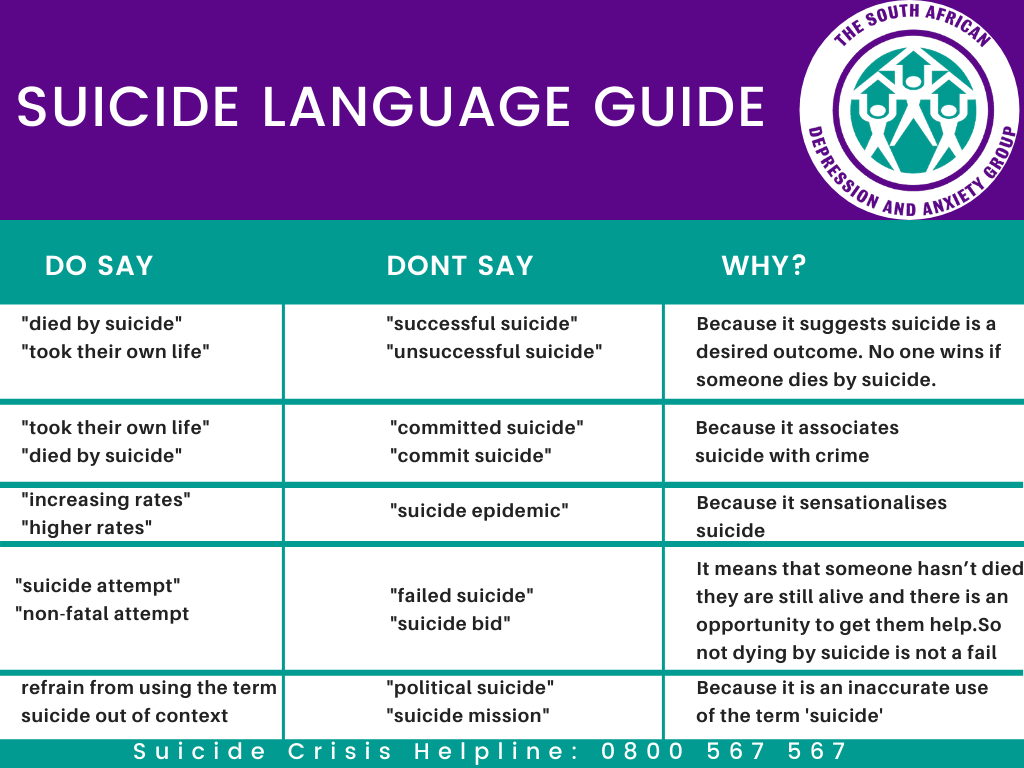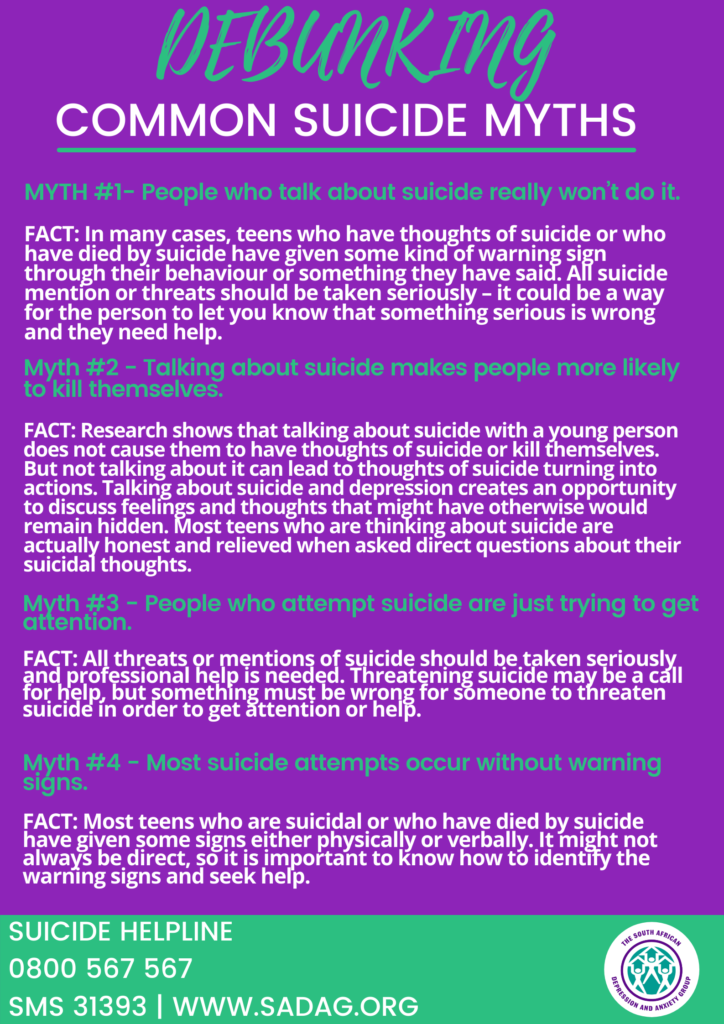Teen Suicide Prevention Week (14 – 21 February 2021) highlights awareness especially around teen Depression. As the COVID-19 pandemic has worsened across the globe and increased stressors for many, the mental health of children and teens has been affected to a large extent. Suicide is the 3rd leading cause of death in 15 – 19 year olds (WHO, 2020).
The South African Depression and Anxiety Group (SADAG) is focusing on creating awareness for Teen Depression and Suicide, as South African teens are at a particularly high risk as the mental health impact of COVID-19 has been immense. South African teens (OUTare especially at riskas they) navigate a new world of online learning or delayed learning, social isolation, loss, grief and trauma, with increased anxiety and depression.
Psychiatrist and SADAG Board Chairperson, Dr Frans Korb, says “There is a myth that depression or suicide doesn’t affect teens or children, in fact it is very real and affects more young people than we know, with teens being a particular high risk for suicide. Depression is the leading cause of suicide, it doesn’t discriminate against age, gender, race, religion or socio-economic background.”
SADAG has seen an increase in the number of calls to the Suicide Helplines, and we encourage parents, teachers and family members to know the warning signs of depression and to reach out for help as soon as possible. Now more than ever, parents need to connect and engage with their children – ask questions, listen carefully to understand, get to know what is happening in their teens lives and what they are feeling and thinking,connecting to help if you pick up any warning signs for depression or suicide before it is too late – it could save a life.
There is still a lot of stigma and fear around suicide, and many parents and teachers are afraid that if they talk about suicide to teens that it would cause them to take their life. SADAG’s Operations Director, Cassey Chambers explains, “Research shows that talking about suicide with a young person DOES NOT cause them to have thoughts of suicide or kill themselves. But NOT talking about it can lead to thoughts of suicide turning into action. Talking about suicide and depression create an opportunity to discuss feelings and thoughts that might have otherwise remain hidden. Most teens who are thinking about suicide are often honest and relieved when asked direct questions about their suicide thoughts or feelings.” But informing and empowering parents and teachers on how to have these conversations with teens is the first step to preventing teen suicide.
SADAG will be hosting 2 free online CONNECT Webinars – one for Teachers (24 February, 3:30pm) and for Parents (25 February, 1pm) with experts to unpack how to identify warning signs of teen depression and suicide at home and in the classroom, self-help tips to deal with depression, how to talk about suicide with a teen, developing a suicide safety plan, and how to connect to help. Visit www.sadag.org for more details about these free Connect Webinars and RSVP for your free seat today.
Miss SA will be using her Instagram platform to focus on Teen Depression for #MindfulMondays on Monday the 15th February at 7pm. SADAG will also be hosting an online #FacebookFriday expert Q&A on Friday the 19th February at 1pm-2pm and again at 7pm-8pm answering all your questions on teen depression, suicide prevention and how to get help LIVE on @TheSADAG.
“Even if you notice 1 warning sign, don’t wait or leave it. Talk today, listen and connect to help – it could save a life,” says SADAG’s, Cassey Chambers.
Possible Warning Signs of suicide include:
- Talking about suicide or death – could be writing or drawing about death and dying, or posting pictures, quotes, or messages on social media
- Writing or sending goodbye letters or messages or posting goodbye messages on social media
- Saying things like “Everyone would be better off if I was dead” or “I wish I wasn’t here anymore” or “I don’t want to be here anymore”
- Giving away prized possessions
- Signs of depression such as moodiness, hopelessness, withdrawal, drastic change in their appetite and sleep, and loss of interest in usual activities
- Increased alcohol and/or other drug use
- Behavioural changes and taking excessive risks

SADAG runs the country’s only Suicide Crisis Helpline (0800 567 567) which is open 24 hours a day, 7 days a week, sms 31393 and a counsellor will call back or you can visit the online toolkit for teen suicide prevention on www.sadag.org. There is always help!

targeted toward Parents.
We understand that there are many aspects that encompass a Mother, Father or Child and strive toward providing resources and services that accommodates
this.
Our content is aimed to inform and educate families on issues starting from
pregnancy through to the challenges of the teen-age years.
- Building a Reading Habit: Books That Kids Actually Love - October 17, 2025
- Dealing With Mom Guilt: Tips to Let Go - October 17, 2025
- Simple Daily Routines That Reduce Stress for Parents - October 16, 2025





